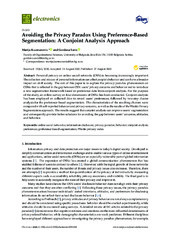Please use this identifier to cite or link to this item:
https://rfos.fon.bg.ac.rs/handle/123456789/2040| Title: | Avoiding the Privacy Paradox Using Preference-Based Segmentation: A Conjoint Analysis Approach | Authors: | Kuzmanović, Marija Savić, Gordana |
Keywords: | Westin privacy index;privacy paradox;preferences;preference-based segmentation;online social networks;information disclosure;conjoint analysis;behavior | Issue Date: | 2020 | Publisher: | MDPI, Basel | Abstract: | Personal privacy on online social networks (OSN) is becoming increasingly important. The collection and misuse of personal information can affect people's behavior and can have a broader impact on civil society. The aim of this paper is to explore the privacy paradox phenomenon on OSNs that is reflected in the gap between OSN users' privacy concerns and behavior and to introduce a new segmentation framework based on preference data from conjoint analysis. For the purpose of the study, an online survey on four dimensions of OSNs has been conducted. Conjoint analysis has been employed on collected data to reveal users' preferences, followed by two-step cluster analysis for the preference-based segmentation. The characteristics of the resulting clusters were compared with self-reported behavior and privacy concerns, as well as the results of the Westin Privacy Segmentation approach. The results suggest that conjoint analysis can improve users' segmentation and consequently provide better solutions for avoiding the gap between users' concerns, attitudes, and behavior. | URI: | https://rfos.fon.bg.ac.rs/handle/123456789/2040 | ISSN: | 2079-9292 |
| Appears in Collections: | Radovi istraživača / Researchers’ publications |
Show full item record
SCOPUSTM
Citations
9
checked on Nov 17, 2025
Page view(s)
24
checked on Dec 28, 2025
Download(s)
4
checked on Dec 28, 2025
Google ScholarTM
Check
Altmetric
This item is licensed under a Creative Commons License


